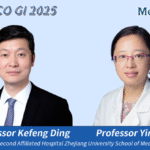
At the 2025 European Lung Cancer Congress (ELCC) held in Paris, Oncology Frontier conducted an exclusive interview with Professor Xue Yang from Peking University Cancer Hospital. In this conversation, Professor Yang shared her insights into the latest research developments on antibody-drug conjugates (ADCs) presented at the congress.Oncology Frontier:What new ADC data were presented at the 2025 ELCC in the field of first-line and later-line lung cancer treatment?
Professor Xue Yang::In the field of later-line treatment, one of the notable updates at the 2025 ELCC was the oral presentation of data from the ORCHARD study (Abstract #1O), which evaluated Dato-DXd in combination with osimertinib in patients who had developed resistance to first-line osimertinib.
The study focused on patients with EGFR-mutant advanced non-small cell lung cancer (NSCLC) who experienced disease progression after first-line osimertinib. In the 6 mg/kg Dato-DXd cohort, the objective response rate (ORR) reached 36%, with a median progression-free survival (PFS) of 11.7 months and a median duration of response (DoR) of 20.5 months.
Notably, the combination also showed promising efficacy in patients with brain metastases, with a manageable safety profile
In the area of first-line treatment exploration, the 2025 ELCC also featured a poster presentation (Abstract #329) on the intracranial efficacy of YL201, a B7-H3-targeted antibody-drug conjugate (ADC).
According to data from the Phase I trial of YL201, among 29 lung cancer patients with baseline brain metastases, the intracranial objective response rate (iORR) was 17.2%, and the median intracranial progression-free survival (iPFS) reached 6.3 months.
Notably, for patients who had not previously received brain radiotherapy, the iORR increased to 57.1%, with an iPFS of 7.4 months. In addition, the treatment was associated with minimal central nervous system toxicity.
Oncology Frontier:Please talk about the challenges faced by the research and development of ADC drugs in the field of lung cancer, and look forward to the application prospects of ADC combination therapy.
Professor Xue Yang: While antibody-drug conjugates (ADCs) have shown considerable promise in the treatment of non-small cell lung cancer (NSCLC), several major challenges remain in their development and clinical application:
- Toxicity Management One of the key challenges lies in managing systemic toxicity and optimizing dosage. The efficacy and safety of ADCs are closely tied to the drug-to-antibody ratio (DAR). A high DAR can enhance potency but may also increase off-target toxicity. Conversely, a low DAR could reduce therapeutic efficacy. Although the bystander effect can broaden the cytotoxic impact, it may also harm normal tissues such as alveolar epithelium, increasing the risk of unintended toxicities.
- Lack of Robust Biomarkers There is currently no standardized or quantitative approach for assessing target expression (e.g., through IHC). For instance, the correlation between TROP2 expression and treatment efficacy varies across studies, underscoring the need for more precise predictive models.
- Drug Resistance Resistance to ADCs may arise due to tumor microenvironment factors, heterogeneity in target expression, or acquired resistance to the cytotoxic payload.
Looking ahead, several strategies may shape the future of ADC application in lung cancer:
- Resistance Mechanism–Driven Combination Therapy Future treatment strategies may involve ADC-based combinations tailored to specific resistance mechanisms—such as MET amplification or HER2 mutations.
- Optimized Sequential Use of ADCs Sequential strategies involving ADCs with different payloads or targets (e.g., TROP2, HER3, B7-H3) may help overcome resistance. An example is the exploration of sequential Dato-DXd and HER3-ADC in the TROPION-Lung01 study.
- Earlier-Line Application and Full Disease Course Management The scope of ADCs may expand from later-line to frontline treatment. For instance, if the ongoing Phase III trial of YL201 in small cell lung cancer yields positive results, it could potentially challenge current first-line chemotherapy regimens—offering new directions for combination strategies and target selection in lung cancer.
References:
- X. Le, et al. Osimertinib (osi) + datopotamab deruxtecan (Dato-DXd) in patients (pts) with EGFR-mutated (EGFRm) advanced NSCLC (aNSCLC) whose disease progressed on first-line (1L) osi: ORCHARD. 2025 ELCC, Abstract 1O.
- H. Zhao, et al. Intracranial efficacy of YL201, a novel B7-H3-targeting antibody-drug conjugate (ADC), in patients (pts) with small cell lung cancer (SCLC) and non-small cell lung cancer (NSCLC). 2025 ELCC, Abstract 329P.

- Doctor of Clinical Medicine, Peking University Health Science Center
- Associate Chief Physician, Department of Thoracic Oncology I, Peking University Cancer Hospital
- Secretary, Youth Committee of the Beijing Medical Award Foundation for Lung Cancer
- Member, CSCO Youth Expert Committee
- Member, CTONG YOUNG
- Member, Lung Cancer Committee of the Beijing Society of Oncology
- Standing Committee Member, CACA Committee on Malignant Pleural Mesothelioma
- Standing Committee Member, Lung Cancer Committee, National Telemedicine and Internet Medicine Center
Over the past five years, Professor Yang has authored or co-authored 10 SCI-indexed papers as first or co-first author, with a cumulative impact factor exceeding 100.
She has also been recognized as one of the “35 under 35” Outstanding Young Oncologists at the 5th edition of the award. Her accolades include:
- Top Ten Speaker at the CACA Oncology TED Science Popularization Conference
- Champion of the “100 Cases in Action” Immunotherapy Case Challenge for Lung Cancer
Champion of the “Brilliant Lung” Lung Cancer Case Challenge.


